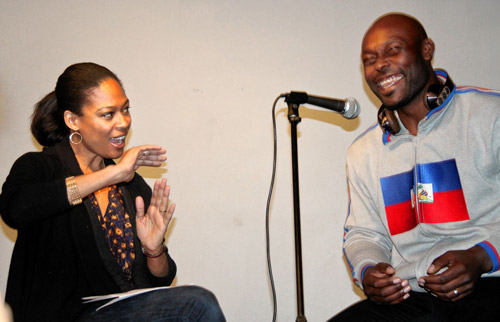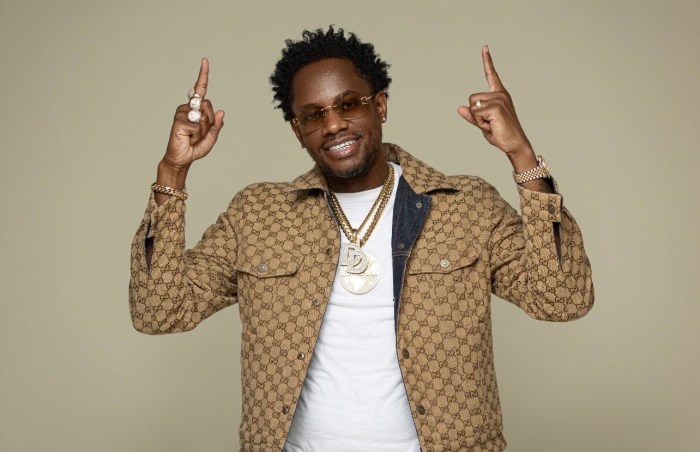Haitian-born Jimmy Jean-Louis plays what might be one of his career’s signature roles in the French made-for-TV movie “Toussaint Louverture.” The actor portrays Toussaint–the Haitian former slave who spearheaded the slave rebellion leading to freedom for the slaves and an independent Haiti from France. (Though he never saw it, dying in a French prison, 8 months before independence was declared).
The film, two one-and-half-hour film segments spanning forty years, will screen as part of the Haiti Film Fest organized by Haiti Cultural Exchange at St. Francis College. The film fest is two full days of free Haitian films, from noon to 9:00 p.m, May 11 &12. For details: haiticultural.org/program-06.
When asked what was the greatest part of playing Toussaint, the actor replied, “Playing Toussaint was the greatest part of playing Toussaint.”
As the first substantial, fictional portrayal of one of Haiti’s great heroes, Jean-Louis is sensitive to the role’s legacy. “I was very conscious that for the next generation, what they’ll know of Toussaint is my face until another film is made. That made it very difficult for me, a lot of pressure.“
Jean-Louis sees this film as an opportunity to educate a public who never knew about this leader and also, to look at Haitians differently.
The actor was asked: Who is Toussaint?
‘To me, he is the greatest hero we have. When I say ‘we’, I’m not just meaning Haiti, but Toussaint gave us the first Black republic. He has been an inspiration to most of the great leaders, Black leaders, and he deserves a lot more recognition. It wasn’t just about freedom and retaliation from oppressors, it was about égalité (equality) for the people. That’s what he was about.”
There were no stunt doubles for this role. Jean-Louis studied horse back riding and sword fighting for two months preparing. He explains, “It was a very physical role. Toussaint is always portrayed as a physical person. He was a general and he knew how to fight. But, not just that, he was mainly a visionary, one that our leaders should learn from. He still remains an example.”
Sensitive to the nuance of leadership, Jean-Louis opines, “He was misunderstood at the time. People didn’t understand Toussaint’s vision. Most of the Haitians wanted to kill all the white people. Meanwhile, he knew that he had to deal with them so the Haitian economy could keep growing.”
“The people thought that he was going to bring back slavery because of the way he behaved with the slaves. Even today, you have some people that say ‘Ah, Toussaint was a sell-out. (They say) Dessalines was the man! He was chopping heads and burning houses. He was the man!’ “
“A lot of people will still tell you that kind of nonsense. And that same kind of nonsense still goes on, in the country, when a leader disappears. People want to burn and kill everything that the leader left, which is ridiculous. You have to use it. Whatever he strengthened, you should continue.”
What was it in Toussaint that he had such a capacity?
“He was a general. He wanted a better life for his people and he had a vision on top of that. I don’t believe that there are that many people that are visionaries. He was there for the people and only the people.”
“Maybe because he was able to go back and forth from Haiti to France, living both lives. He could see something different that others couldn’t see. He was a French general. He was well educated, having the conscience to reach back to his roots to his people. It opened up some roads that made him become who he became.”
Is he similar to Moses?
“All leaders have similarities. Why not? Maybe he is our Moses. I wish he were promoted as our Moses. When you get close to other cultures you do see things differently and it’s what you make of it.”
Jean-Louis also thinks this film can help Haitians look at themselves differently and ask themselves: What happened? What happened between then and now? We used to be the most powerful island in the region. Is it our leaders? Because we got our independence and the super powers decided to cross us? Is it the debt we had to pay? What happened?
A conversation with the actor ends with a reminder of Hollywood Unites for Haiti (www.hufh.org), a non-profit he founded that supports sports, cultural activities for children and a school in the remote village of Cadet, Haiti.

Photo by Veeren-EloaProd

























